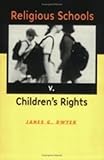Religious Schools v. Children's Rights / James G. Dwyer.
Material type: TextPublisher: Ithaca, NY : Cornell University Press, [2018]Copyright date: ©2001Description: 1 online resource (216 p.)Content type:
TextPublisher: Ithaca, NY : Cornell University Press, [2018]Copyright date: ©2001Description: 1 online resource (216 p.)Content type: - 9781501723834
- 344.73/0796 21
- KF4124 .D98 1998
- online - DeGruyter
| Item type | Current library | Call number | URL | Status | Notes | Barcode | |
|---|---|---|---|---|---|---|---|
 eBook
eBook
|
Biblioteca "Angelicum" Pont. Univ. S.Tommaso d'Aquino Nuvola online | online - DeGruyter (Browse shelf(Opens below)) | Online access | Not for loan (Accesso limitato) | Accesso per gli utenti autorizzati / Access for authorized users | (dgr)9781501723834 |
Frontmatter -- Contents -- Preface to the Cornell Paperbacks Edition -- Acknowledgments -- Introduction -- 1. Catholic and Fundamentalist Schooling Today -- 2. The Constitutional Backdrop -- 3. Why Parents' Rights Are Wrong -- 4. Against a Community Right to Educate -- 5. A Right to Equal Treatment -- 6. Justice for Children -- Conclusion -- Notes -- Index
restricted access online access with authorization star
http://purl.org/coar/access_right/c_16ec
Despair over the reported inadequacies of public education leads many people to consider religious schools as an alternative. James G. Dwyer demonstrates, however, that religious schooling is almost completely unregulated and that common pedagogical practices in fundamentalist Christian and Catholic schools may be damaging to children. He presents evidence of excessive restriction of children's basic liberties, stifling of intellectual development, the instilling of dogmatic and intolerant attitudes, as well as the infliction of psychological and emotional harms, including excessive guilt and repression and, especially among girls, diminished self-esteem. Courts, legal and political theorists, and the public typically argue that families and religious communities are entitled to raise their children as they see fit and that the state must remain neutral on religious matters. Dwyer proposes an alternative framework for state policy regarding religious schooling and other child-rearing practices, urging that the focus always be on what is best, from a secular perspective, for the affected children. He argues that the children who attend religious schools have a right to adequate state regulation and oversight of their education. States are obligated to ensure that such schools do not engage in harmful practices and that they provide their students with the training necessary for pursuit of a broad range of careers and for full citizenship in a pluralistic, democratic society.
Mode of access: Internet via World Wide Web.
In English.
Description based on online resource; title from PDF title page (publisher's Web site, viewed 26. Apr 2024)


